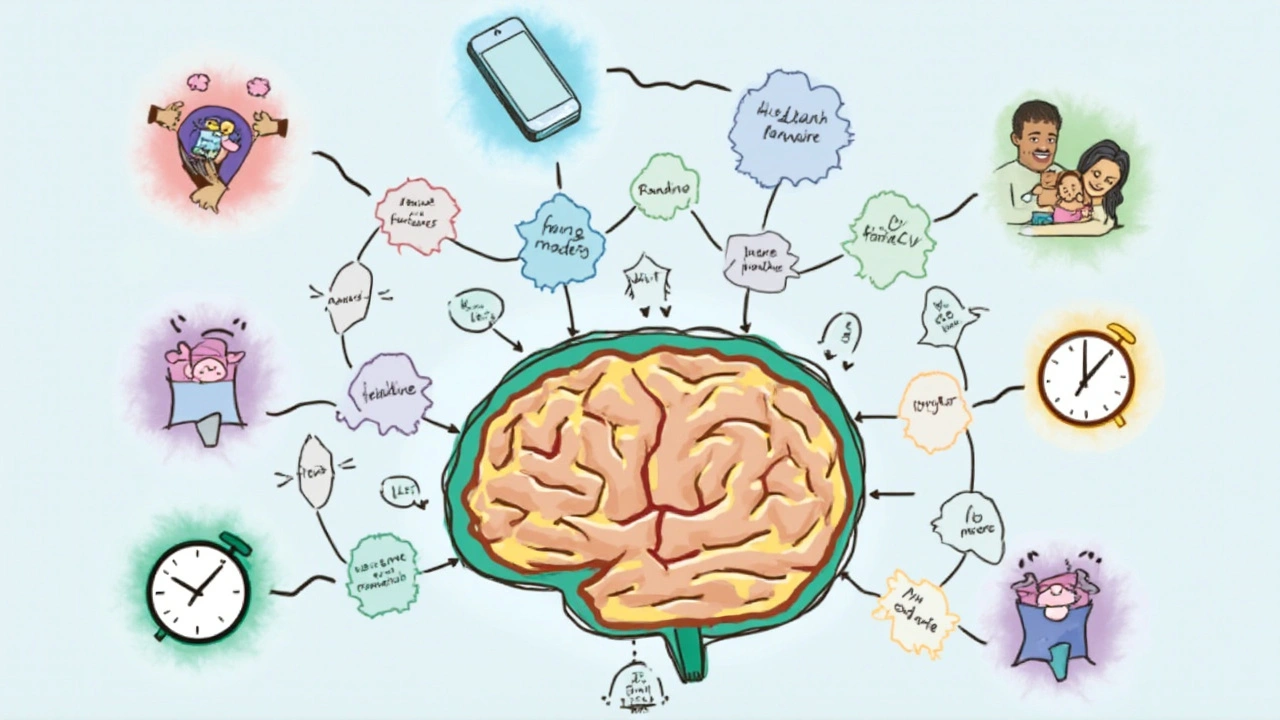Depressive Disorder: Key Symptoms, Real Causes, and Proven Treatments Explained

We tend to picture depression as sadness, maybe a person curled up under a blanket ignoring calls. But there’s way more beneath the surface—truth is, depression can be invisible even to those who have it. It shows up in missed deadlines, skipped meals, lost friendships, or mornings where brushing your teeth feels like running a marathon. It’s the most common mental health disorder worldwide, recognized by the World Health Organization as the leading cause of disability. Yet, myths and misunderstanding still swirl around it, keeping people quiet and stuck. Let’s break that silence.
Spotting the Sneaky Symptoms of Depressive Disorder
Most think of depression as constant sadness, but that's just the tip of the iceberg. It can look like chronic irritability, numbness, or being exhausted even after a full night’s sleep. Sometimes, you lose the ability to enjoy things you used to love—friends, food, music—nothing lights you up. Appetite, weight, and sleep can swing both ways, too. Some people eat way more, others struggle to keep food down. Falling asleep might be impossible, or you might sleep for twelve hours and still feel drained.
What about those “physical” symptoms? Headaches, stomach troubles, random aches—especially when doctors can’t find a cause—can all be linked. Then there's the hardest part: feeling worthless. It might whisper you’re a burden or that the world would be better off without you. These thoughts can sneak up quietly, and that makes them dangerous.
The Diagnostic and Statistical Manual of Mental Disorders (DSM-5), which is kind of like the “rulebook” for mental health professionals, says a person should show several of these signs most of the day, nearly every day, for at least two weeks before calling it major depressive disorder. But honestly, nobody with depression is ticking boxes—they’re just trying to get through the day.
Look at this quick table for a breakdown of common symptoms:
| Emotional | Physical | Cognitive |
|---|---|---|
| Persistent sadness Irritability Hopelessness | Fatigue Insomnia or oversleeping Headaches | Difficulty concentrating Indecisiveness Memory issues |
Kids and teens deal with depression too, but it often shows up as being cranky, clingy, or suddenly dropping grades. Sometimes, in elderly folks, depression surfaces as forgetfulness or aches that never seem to heal. So, really, it’s sneaky—that’s why recognizing the subtle signs is so crucial.
What Really Causes Depressive Disorder?
If you’re wondering why depression happens, you’re not alone—and “because you’re weak” is a myth that needs to die. Depression is as real as diabetes or asthma. Scientists agree it’s a complex mix of genetics, brain chemistry, and life events.
Some people are born with a higher risk thanks to their genes. If a parent or sibling has had depression, your odds double. But nobody’s fated to get it, and some folks with all the “right” risk factors never experience it. Brain chemistry matters too; scans show people with depression often have low levels of neurotransmitters like serotonin and dopamine. But it's not as simple as topping off a tank. Chronic stress—even from something like money troubles, losing a job, or being bullied—can physically shrink certain brain regions, like the hippocampus. Imagine your brain under siege for years. That leaves deep marks.
There’s more: certain medications (like steroids, birth control, or blood pressure drugs) and medical conditions (like thyroid issues or vitamin D deficiency) can jumpstart depression symptoms. Even your gut health can play a role. Researchers are discovering that gut bacteria influence mood—no joke, the “gut-brain axis” is a real thing. A fascinating study led by Dr. John Cryan at University College Cork found changes in gut bacteria can lead to depressive-like behavior in animals.
Lifestyle matters too, of course. A diet high in processed foods and sugar can increase risk, while regular exercise is shown to be as effective as some antidepressants for mild depression. And then, there’s trauma—early childhood neglect, violence, or losing a loved one can “prime” the brain for depression years or decades later. Here’s the real kicker: sometimes depression sneaks up with no obvious cause at all. That doesn't make it any less valid.

Proven Treatments: Real Solutions for Real People
“Just snap out of it” isn’t advice, it’s misunderstanding. Treating depressive disorder usually means piecing together a few different strategies—it’s rarely one-size-fits-all. Let’s start with therapy. Cognitive Behavioral Therapy (CBT) is super well-studied, practical, and based on helping you spot unfair thoughts and replace them with more useful ones. Weekly sessions with a therapist can, over time, lower relapse rates by half. Good therapists don’t just listen—they teach you skills, kind of like a coach for your brain. If you want a quote from the experts, here’s Dr. Judith Beck, president of the Beck Institute for Cognitive Behavior Therapy:
"CBT empowers people to become their own therapists—making changes now and preventing symptoms from coming back later.”
Medication is another piece for many. Antidepressants work for around 60-70% of people with moderate to severe depression, according to data published in the BMJ in 2023. The most common ones are SSRIs (selective serotonin reuptake inhibitors), but sometimes older classes like tricyclics or SNRIs make sense too. Side effects can be tough—nausea, weight changes, sleep issues—but most fade after a few weeks. Always, always work with your doctor before starting or stopping a medication.
But what if you’re not ready for therapy or meds? There’s solid evidence that daily exercise—something as basic as a brisk 30-minute walk—can lift mood, boost energy, and reduce relapse risk. A Harvard Medical School review in 2022 highlighted that people who walked or biked most days lowered their risk of new-onset depression by 26%. Not into sports? Gardening, yoga, and even dancing in your kitchen count too. Then, there’s sleep hygiene: sticking to a schedule, minimizing screens before bed, and making your bedroom cozy all help reset your brain’s “rhythms.”
For severe, stubborn symptoms, modern medicine offers more advanced solutions. Transcranial Magnetic Stimulation (TMS) and electroconvulsive therapy (ECT) aren’t as scary as movies make them sound. They target the brain with gentle pulses and, for many who don’t respond to other treatments, they’re lifesavers. As of 2024, a new ketamine nasal spray is also showing promise for rapid relief in suicidal depression—though it’s still closely monitored by specialists.
Supporting Yourself or Someone Going Through Depression
If you’re reading this for yourself, please know there’s no shame in reaching out. The world has come a long way, but too many still bottle things up out of embarrassment or fear. Try keeping a daily journal (even just a “mood tracker”), making one tiny “win” goal per day, or texting a friend just to say “hey.” Sometimes, food and water are all you can manage, and that’s enough for now. You’re not being lazy, dramatic, or selfish—it’s an illness, not a character flaw.
If you’ve got a loved one dealing with depression, patience is everything. Avoid pep talks like “look on the bright side”—they almost never help. Instead, validate their feelings: “I can see this is really hard, but I’m here for you.” Offer practical help, like bringing them groceries, sending a funny meme, or just watching a movie together. Avoid pushing for big changes unless they ask.
- Listen more than you talk
- Don’t try to “fix” things—support instead
- Stay in touch, even if they don’t always respond
- Learn the warning signs of suicide—if a person talks about death, starts giving away things, or suddenly seems calm after a deep “low,” get them to help
- Encourage, but don’t force, professional support
Here’s a tip: free mental health hotlines and online chats are more available than ever. And if old-school therapy feels too much, digital therapy apps like BetterHelp or Talkspace have exploded in popularity—heaps of people find it easier to open up online.

Breaking the Stigma and Prioritizing Mental Health
If you’re tired of seeing mental illness brushed aside, you’re not alone—stigma is still a massive problem. Only about a third of those with depression ever get treated, according to the World Health Organization, even though there are proven solutions. Myths and old-school thinking linger because mental health still isn’t talked about like physical health. How many times have you heard, “Just toughen up”? Science and empathy both point the other way—it’s not about character, it’s about biology, experiences, and support.
Social policies are playing catch-up too. In places like Sweden and Australia, national campaigns have made talking about depression as routine as getting a flu shot. Positive school programs, workplace mental health days, and even new Snapchat features encouraging users to check in with friends—change is happening, even if slowly.
But the bottom line is, nobody gets through this alone. Trying to fight depression solo is like hiking with a backpack full of bricks. Finding small daily joys—whether it's the first sip of coffee, a silly video clip, or just watching the dog chase its tail—can slowly rebuild your energy. Seeking help isn’t a weakness, it’s the first step to healing. And if you’re struggling, don’t wait for total collapse before reaching out.
Feeling low is part of being human, but when it’s heavy and unending, it has a name—depression. And depression, for all its shadows, can’t survive connection, treatment, and time. You matter, and you’re never as alone in the fight as you think.

Sunil Kamle
July 18, 2025 AT 16:31What a well-structured breakdown on such a complex topic! Depression truly is one of those issues that, if not properly understood, ends up painted in broad strokes of stigma and misconceptions.
It’s refreshing to see an article that pushes beyond the usual vague descriptions and dives into both the symptoms and causes with clarity and, most importantly, scientifically backed treatments. It's like shining a light into a very dark room and clearing the fog.
I appreciate how the article also addresses the sneaky symptoms that people often overlook or dismiss. Getting ahead of those signs is key to early intervention.
What would be interesting to discuss further is the role of social support systems and how they interact with proven treatments, don’t you think? Mental health is often seen as an individual battle, but the community and environment around a person play a massive part.
Overall, this feels like a much-needed candid talk about depression that could spark understanding in places where silence usually prevails.
Michael Weber
July 20, 2025 AT 10:29Typical. Everyone loves to throw around the phrase "science-backed" as if they’ve uncovered the grand truth. Depression isn’t just about biology or neatly categorized causes — it’s tangled with the human condition, society’s failures, and our incessant need to mask real feelings.
This post attempts to dissect the issue clinically, but what about the existential pain people endure? The real root is often ignored: our alienation from purpose and connection.
You can list symptoms and treatments all day, but what about the soul-crushing void that medication or therapy sometimes can’t touch?
I’m all for understanding mental illness, but let’s not get too comfortable with simplified narratives that suit modern pop psychology.
Just saying, read this with a grain of salt. There’s more lurking under the surface.
Shana Shapiro '19
July 21, 2025 AT 14:34This article really hits home. It’s so difficult to talk about depression without feeling inadequate or misunderstood by others, but breaking it down into clear signs helps people feel less alone.
The emphasis on straightforward language is especially helpful because mental health jargon can be overwhelming and alienating.
What struck me the most was how the article encourages awareness without fear — that’s a delicate balance to achieve. People battling depression often drop subtle hints that go unnoticed, and those moments can mean everything when someone does notice and responds with empathy.
Reading this guide felt like a reminder that recognizing depression isn’t about labeling someone, but about offering support and understanding.
I wish more resources were this accessible and compassionate. It makes discussing mental health less daunting and much more hopeful.
Lindsey Bollig
July 23, 2025 AT 02:59I love how this article doesn’t sugarcoat the reality of depression but still manages to inspire hope through treatment!
Too often people assume depression is just about feeling sad, but this guide clearly points out the complexity involved including the biological, psychological, and environmental factors.
It’s also important to highlight evidence-based treatments because misinformation can lead people down fruitless paths.
That said, I’d add that self-care strategies and building resilience are crucial companions to professional help, especially when navigating the ups and downs.
This kind of practical, honest information helps remove the stigma and encourages more people to seek help sooner rather than later.
Blake Marshall
July 23, 2025 AT 11:36Okay, I gotta say, reading stuff like "science-backed treatments" always makes me wanna roll my eyes at the same time as nodding.
Yeah, meds and therapy do work for some, but honestly there’s a ton of factors they don’t address — lifestyle, personal mindset, social influences — which are huge parts of the puzzle.
Also the symptom detection part? Pretty much everyone I know with depression has their own weird way it shows up. It’s not one-size-fits-all at all.
The article’s solid overall, but I feel like it oversimplifies how messy this whole thing really is. Just another guide telling you what you want to hear, you know?
Jillian Bell
July 24, 2025 AT 12:54Anyone else get a little suspicious when articles like this talk about depression as if it's all neatly definable? Sometimes I wonder if the so-called 'depression epidemic' isn’t a product of external conditions designed to keep people compliant, distracted, and medicated.
Especially with the increasing push to pathologize normal reactions to stress and adversity. What happened to resilience and self-reliance?
It’s like the system benefits when people stay labeled and dependent on treatments instead of questioning the bigger picture. I’m not denying depression is real, but the causes and 'cures' are often so conveniently framed.
I guess I’m just wary of corporate and medical interests when they present 'solutions' as if they’re absolute. Seems more like a narrative control to me.
Zachary Schroer
July 29, 2025 AT 23:53This whole discussion reeks of oversimplification and performative empathy, frankly. The mainstream mental health narrative loves to package depression in digestible bites so it can be managed and monetized.
Everyone parrots the same script about symptoms and treatments but rarely question if these 'evidence-based' approaches are just symptom suppressors for systemic malaise.
Follow the money and you’ll see who really benefits from perpetuating this model.
And let’s not forget the armchair experts who flood these threads with pseudo-advice, diluting genuine discourse into banal self-help clichés.
If you want to talk about depression, bring in critiques of capitalism and cultural decay, not just the easy-to-swallow medical bullet points.
Ben Lee
August 4, 2025 AT 13:38I think there’s value in both the clinical perspective and the broader social context. Depression isn’t just one thing; it’s a complex interplay between genetics, psychology, environment, and yes, societal factors.
What this article does well is demystify symptoms and point out viable treatments for people who might be hesitant to seek help.
It’s crucial to build a system where people feel safe talking about their struggles without judgment and where treatment options are accessible and diverse enough to fit individual needs.
At the same time, awareness campaigns should encourage community engagement — sometimes just knowing someone cares can be as healing as professional treatment.
We need a holistic approach that includes medical science, peer support, social justice, and ongoing dialogue.
Alan Kogosowski
August 6, 2025 AT 21:34From a more academic standpoint, the article is a commendable primer on depressive disorder, balancing accessibility with factual accuracy.
The delineation of 'sneaky symptoms' is particularly useful, as it elucidates manifestations that often evade recognition by both patients and clinicians.
Moreover, the integration of expert quotations adds a layer of credibility without overwhelming the lay reader.
However, it would be intriguing to see a deeper exploration of emerging therapies beyond the conventional pharmacological and psychotherapeutic modalities, such as neurostimulation or integrative approaches.
Nonetheless, this piece serves as a solid foundation for those seeking clarity on a subject fraught with stigma and misinformation.
David Brice
August 11, 2025 AT 13:08I really want to stress how important it is not just to identify symptoms or blindly follow treatments, but to tailor approaches that respect each person’s unique history and needs.
There’s so much trial and error with depression management that a cookie-cutter solution rarely works.
Connection and honest communication between patient and caregiver are fundamental.
Also, educating families and communities creates an environment where healing is sustainable beyond clinical settings.
Let’s not overlook the power of peer support networks and coaching alongside traditional treatment.
Stacy Whitman
August 17, 2025 AT 13:41Honestly, while I agree awareness is key, I can’t help but feel that society’s obsession with labeling every emotional dip as a disorder contributes to a culture of weakness and entitlement.
We need to be cautious about medicalizing normal human suffering and resilience building.
This article is thorough, yes, but it brushes over the necessity for individuals to face challenges without immediately seeking external validation or intervention.
Strong communities and personal accountability still play irreplaceable roles in mental wellness that no treatment can substitute.
Let's elevate the conversation beyond clinical symptomatology to include values of strength and perseverance.